Us-China trade war leads the United States auto industry to ruin
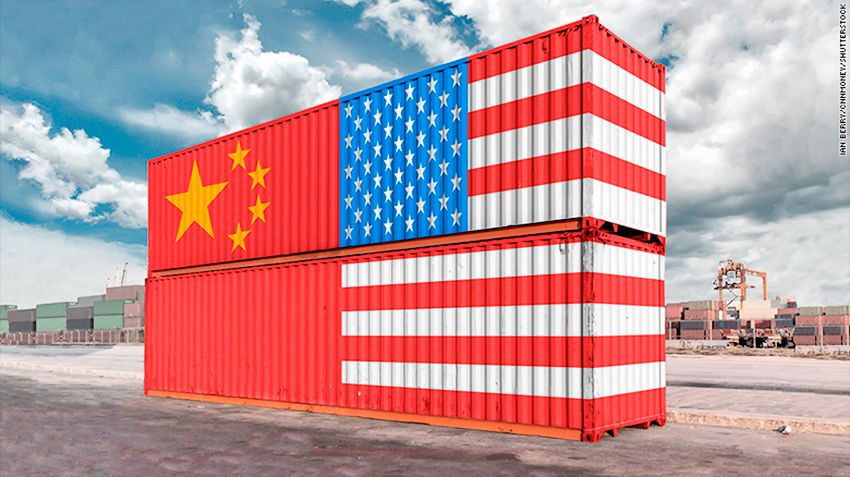
20 June 2018
Representatives of business have warned Washington against trade war with China
The U.S. government released two lists of imports from China of products covered by anti-dumping tariffs in the amount of $50 billion, including automobiles and spare parts to be purchased OEM supplier for domestic automobile production.
Imposed 25 percent tariffs are an attempt to stop the practice of Beijing forced foreign companies to transfer to the Chinese side know-how of foreign partners in joint ventures, as well as an attempt to deter misappropriation of intellectual property by the Chinese government and companies.
In turn, China responded quickly to the introduction of increased tariffs on imports 659 position of American goods in the amount of $50 billion, including cars, agricultural products and other products. High cost of China for agricultural products from the United States, totaling nearly $6 billion come into force on 6 July.
"The U.S. ignored the strong protests and the official statement of the Chinese government and insisted on making decisions that violate WTO rules," – said in a statement, the Ministry of Commerce of China.
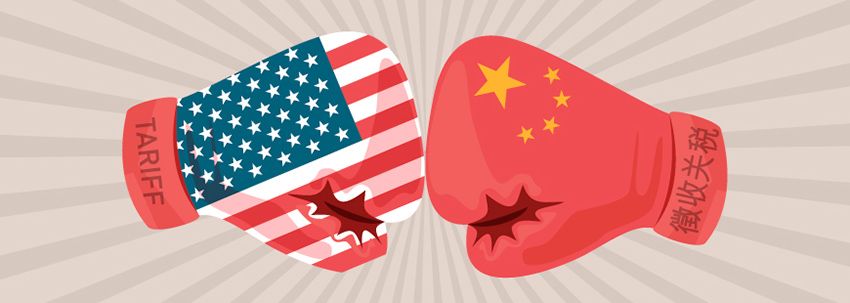
"If the United States will take unilateral, protectionist measures are detrimental to the interests of China, we will quickly respond and take the necessary steps to resolutely defend our just and legal rights," – said at a press briefing on 15 June, a spokesman for the Chinese foreign Ministry Geng Shuang.
Friday the response of Beijing to substantially reverse an earlier decision to reduce, from 1 July, tariffs on imported cars made in the USA with the same high enough rate to 25% to 15% to counter the complaints of administration of the President of trump on the imbalance in U.S.-China trade.
Automotive company Tesla Inc., Daimler AG, BMW AG and Ford Motor Co. are the one of the largest exporters, from USA to China. For example, the BMW Assembly plant in Spartanburg, South Carolina, is considered the country's largest exporter of passenger cars with deliveries in more than 100 countries, including China.
In Ford Motor company said that export to China, about 80 000 vehicles per year, including different models of premium brand Lincoln.
Today China imports some 270,000 cars in U.S. production annually, amounting to $11 billion. in contrast, the list of passenger cars and pickups produced in China and exported to the US, a relatively small and includes only a compact crossover Buick Envision and the Volvo S60 sedan.
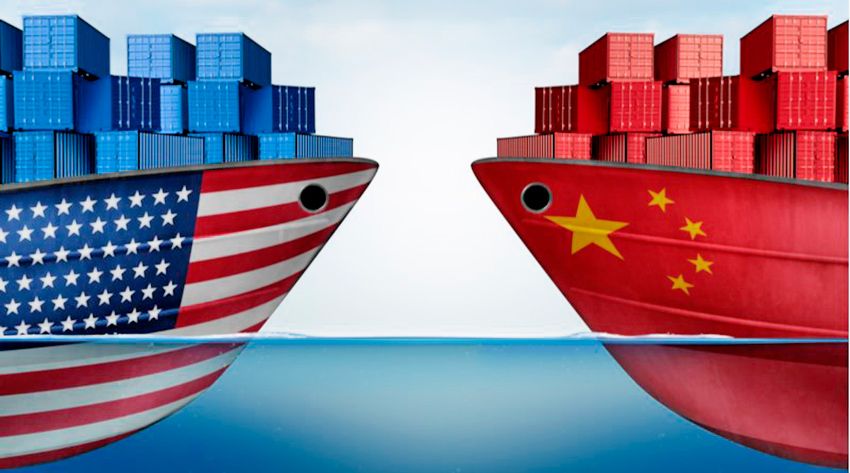
Automakers have warned that escalation of a trade dispute between China and the United States over time, would seriously damage the industry
"The President has raised legitimate questions about China, but in a trade war benefits no one. Make no mistake, American consumers and American manufacturers will be seriously affected by these actions," said John Bozzella, Director General of the Association of global automakers (Association of Global Automakers), a lobbying group in Washington that represents the interests of car manufacturers, including Toyota, Nissan and Hyundai.
Daimler AG exports passenger cars GLS, GLE and GLE coupe the Mercedes-Benz brand in China with its factory in Alabama. The company refused to say how many cars it exports to China, but noted that the export of cars from the plant in Alabama is carried out in 150 countries.
The representative of Daimler declined to comment on the steps of the us administration against China, stating that they still consider the situation.
Executive publisher and Autotrader Blue Book Karl Brauer said input Chinese tariffs is unlikely to lead to the fact that BMW or Mercedes-Benz will close its American plants or fired workers.
"Automakers are instead simply redistributed the products manufactured in Spartanburg and Tuscaloosa from Chinese into other markets," said brayer.
Although a 25% rate will really affect sales, but is likely to be ineffective, because the wealthy buyers of premium cars in China are characterized by high price elasticity," said he. "The increase in Chinese tariffs of 25% will not lead to a 25-percent drop in sales".
Second list
The administration in Washington finalizing a second list of elevated tariffs on Chinese goods worth $100 billion in the expectation that Beijing will respond to the initial U.S. tariff list of the in-kind, sources said to Reuters.
So, in the original list were not included, for example, the Chinese flat panel TVs and other products, the demand for which consumers are usually stored, after a period of public comment.
"We must take decisive defensive action to protect America's leadership in technology and innovation from the unprecedented threat posed by the theft of our intellectual property, the forcible borrowing of American technology and cyber attacks on our computer networks," – said in his statement, U.S. Trade representative Robert Lighthizer.
"The Chinese government is actively working to undermine the high-tech industry of America and our economic superiority through unfair trade practices and industrial policies, such as "Made in China 2025". Technology and innovation are the major economic assets of America, and President of the trump is right to recognize that if we want our country to prosper in the future, we must defend fair trade and to protect the competitiveness of the United States."
This step occurs on the background of increasing global trade tensions, as the administration of the trump suits of a trade war with allies and other trading partners to protect domestic industries.
China and other countries are threatened with retaliation for the introduction of new US tariffs, which they say violates world trade organization rules. The business community, and most American experts say that the increase in import tariffs imposed based on false arguments and hurt the US economy, but in the case of China, it is necessary to take measures against unfair trade practices. However, critics say that the best approach is to work on a joint strategy with the coalition of partner countries, which are similar to the China problem, not alone.
"The introduction of high tariffs shifts the costs of the unfair trade practices of China squarely on the shoulders of American consumers, producers, farmers and ranchers. This is the wrong approach," – said in a statement, the President of the chamber of Commerce, Thomas Donahue.
The list of products, published on Friday, covers a total of 1102 positions focused on industrial sectors that contribute to the industrial policy of China or benefit from it, including in the fields of aerospace, information and communication technology, robotics, industrial equipment, new materials and automobiles. The list does not include ordinary consumer goods typically purchased by Americans, such as cell phones or televisions.
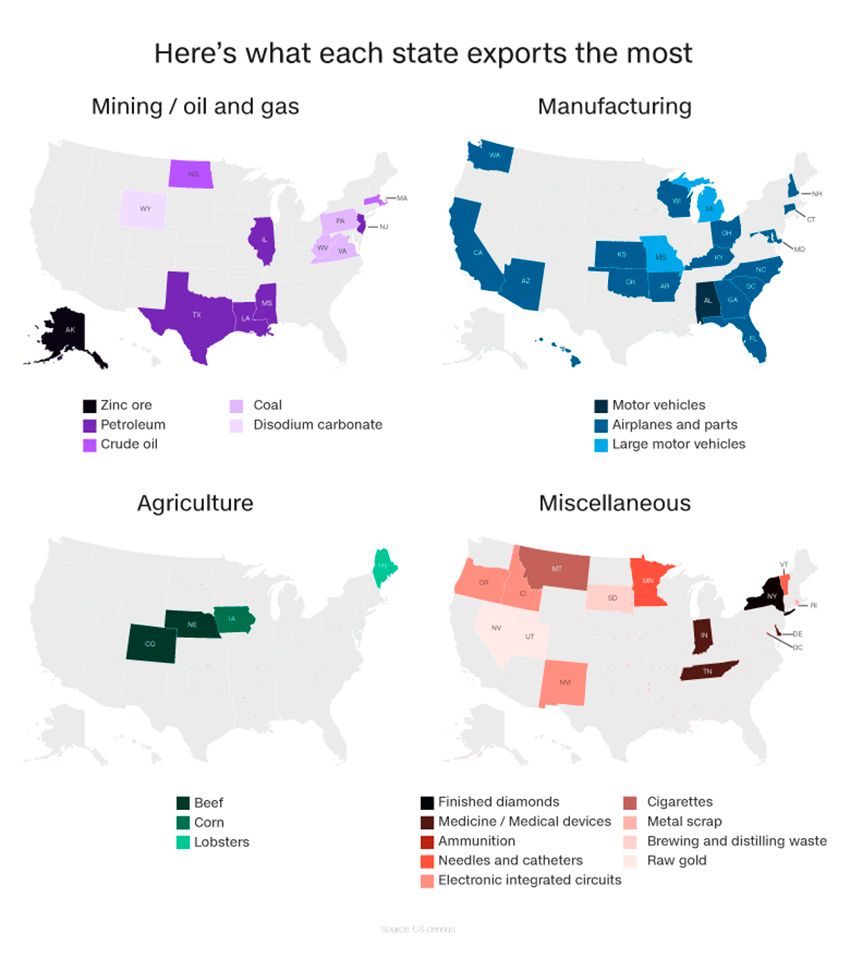
The table illustrates what the States and for some positions will suffer from the introduction of new tariffs
The first list was included 818 products worth about $34 billion, and the new rates take effect from 6th July.The second list contains 284 tariff positions determined by the interdepartmental Committee as compensation from the illegal industrial policy of China. The sum of these products is about $16 billion, the List will be subject to further consideration and public discussion before the USTR will choose the final decision. Products in this final list may be subject to additional charges.
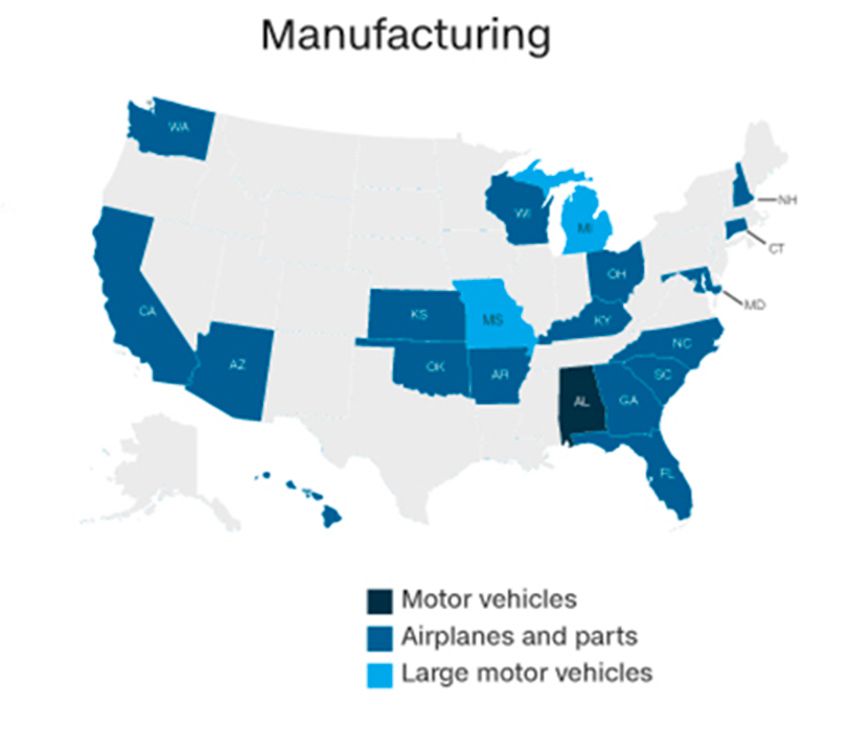
From the introduction of new tariffs in the aircraft industry and the automotive industry affected 19 States (of them directly in the automotive industry 3 state)
The original list included USTR 1 333 offered product is subject to new higher rates.At the same time, USTR announced that in a few weeks will be a mechanism for companies that can't find certain products in the US and then be able to request exclusion from tariffs, as was done with the recent tariffs on steel and aluminum.
the Voice of one crying
The automotive suppliers have condemned the introduction of new tariffs, which were first proposed in March after an investigation USTR. The owner of the company Lucerne International release door hinges Mary Bussigel last month testified at a public hearing, that the rates may take her company out of business due to too high costs.
Her message apparently reached the right ears and loops were excluded from the published list of rates. In a statement, Bucther said she was grateful for the decision to "save my company, the public and employees from the unforeseen consequences of the placement of the tariff on hinges, designed for cars: "While I agree that the trade deficit with China to be solved, but as the industry leader, I remain concerned about the widespread impact of tariffs on the automotive companies, suppliers and consumers. I strongly recommend to adjust future actions to prevent the explosion and the beginning of a disastrous trade war"..
|
|
|
Element was not found.








